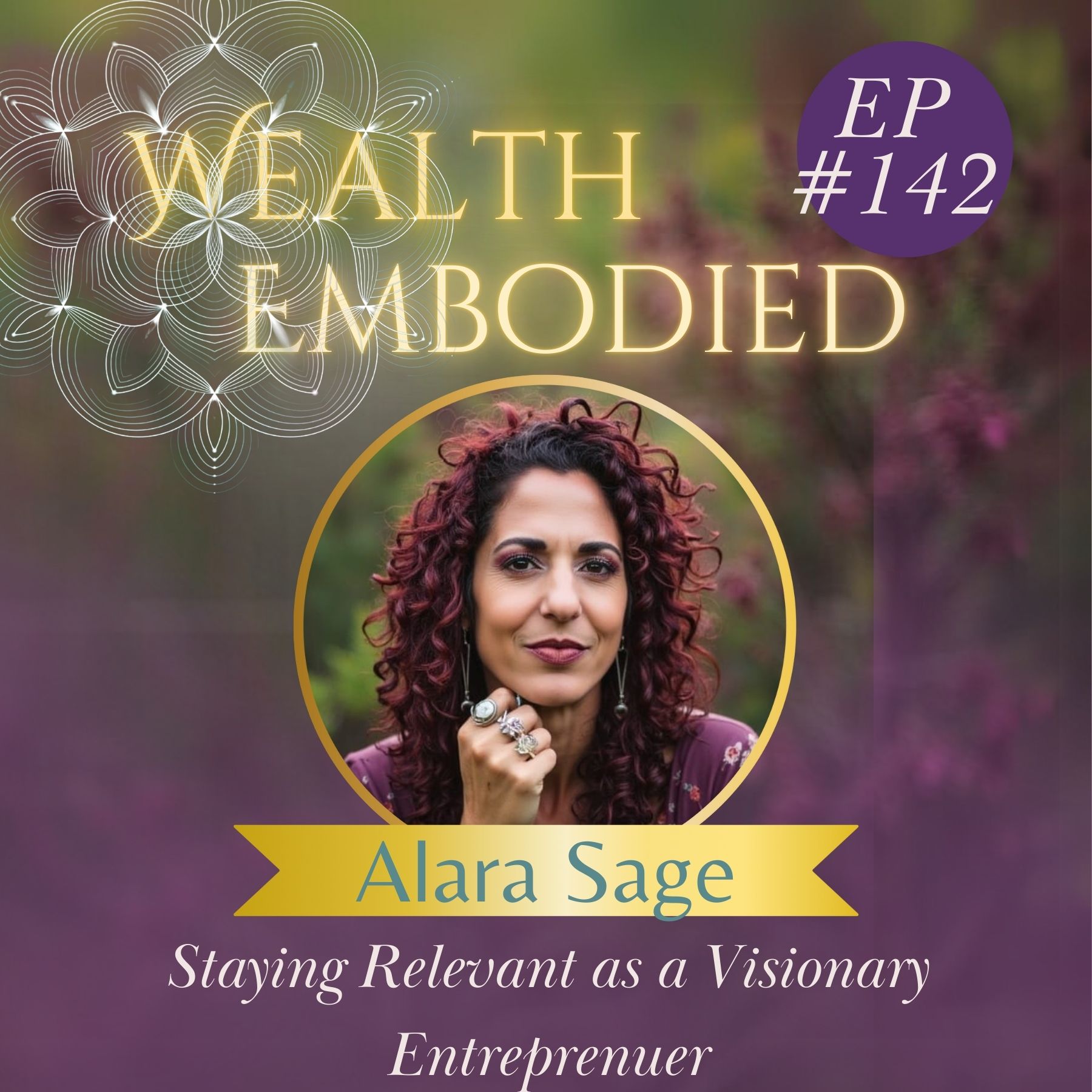Episode Transcript
Alara Sage (00:01.729)
Hello, hello and welcome to another episode of Wealth Embodied where we activate you and your wealth consciousness, your creative genius and your visionary impact. I'm your host, Alara Sage and today I have a special guest with me, John Duguie and I don't actually have an introduction. I'm going to let him introduce himself because I don't have that information, but I'm really excited about the conversation that we're going to have and the depth through which we're going to talk about portfolios and financial advisors today.
John, welcome to the show.
John Joseph De Goey (00:33.486)
Thank you, Allara. Okay, so maybe I can begin by doing a intro so that your viewers and listeners can understand who I am. I'm a financial advisor and portfolio manager. I've been in the business for a little over 30 years. And a lot of what I find passionate, what I find is my passion is bringing advisors, the people who give financial advice and consumers together to help them understand each other more comprehensively. I've written three books.
Alara Sage (00:41.792)
Yes!
John Joseph De Goey (01:03.042)
My most recent is called Bullshift. You can see it there over my shoulder. Bullshift is how the financial services industry shifts your attention to make you feel more bullish. The title is How Optimism Bias Threatens Your Finances. I'm also a podcaster as well. I have my own podcast and it's called Make Better Wealth Decisions. I don't stop there.
Alara Sage (01:23.957)
Beautiful. So you're helping bring these two together. And what do you really find is important with why they need to understand each other better?
John Joseph De Goey (01:35.704)
think most people who give financial advice do a good job of understanding their clients because it's part of their job that they have to make recommendations that are suitable and they have to understand their risk tolerance and their profile and their age and so forth. But the people who are getting the advice are not as well equipped. They don't know what questions to ask. They don't know how to probe to understand if their advisor is giving them biased advice or has blind spots that they might not be aware of.
Obviously it's very difficult to control for something to correct problems if you're oblivious to those problems in the first place. And so I try to give people tools to ask better questions so that they can have a more fruitful relationship.
Alara Sage (02:18.441)
I love that because questions are so powerful, right? And we gain so much more awareness through great questions. So you have one of the topics you were considering speaking about today is the three questions that somebody can ask to really assess their advisors credibility. And since we're on this topic, what are those three questions that you help the potential customer to ask those questions?
John Joseph De Goey (02:43.682)
First off, there could be dozens, but I have to stop somewhere, right? So let's just, I've got to think about two dozen of them in my previous book. So the first question that I would ask is, what does the research say? Because there are a lot of financial advisors that are really glorified sales representatives and they're representing a product or a worldview that might not be consistent with what the research is saying. And so you want to understand.
Alara Sage (02:47.425)
You
John Joseph De Goey (03:09.964)
what the best research there have been a number of Nobel prizes that have been awarded in finance. And you probably want to do what the Nobel laureates are saying as opposed to just what someone is saying because it sounds like a good idea. So that's the first question. The second question is how are you compensated and how does that align with what's best for me? Because some people who give advice get paid via commission. Some people who do planning work will do financial planning work on a fee only basis.
And some people will give away the planning and charge for the advice, but they will charge a percentage of assets. Now, neither of those is necessarily wrong, but they have biases that are associated with them. And it's important that you understand what those biases may or may not be. so that, so that you can guard against them. think the last question that, that maybe is best for your listeners today is, you a fiduciary? So a lot of people can give advice and.
The standard for most people who give financial advice is the advice has to be suitable. It has to be not wrong. But fiduciary is a higher standard. That's the standard where you actually have to do what is best for the client. It's not enough to make a good recommendation. You have to try to find the best recommendation. And that's a better way to protect yourself if you're an investor.
Alara Sage (04:30.229)
Yeah, my very first experience with a financial advisor, I didn't actually know what they were. And when I reached out to a couple of them, I soon learned that the two that I reached out to and spoke with, they were attempting to get a commission through a particular investment. And it was very interesting to me because I hadn't thought that that's how they necessarily worked. And I didn't resonate with what they were trying to sell me, not that that was necessarily wrong or anything, but
It was definitely kind of a thorn in my side until I spoke to a couple of other different financial advisors and realized what you said is there's different ways that financial advisors work and how they earn their income. Because absolutely everybody deserves to earn income through the work and the services that they are providing and really understanding which one do you feel most aligned with and understanding the depth through, yeah, how are they making their money? I think that transparency is really important.
John Joseph De Goey (05:28.654)
I couldn't agree more. And that's one of the things that I've been railing against for, as I say, I've been in the business for more than 30 years and I've been talking about it in my books and in the articles I write for well over 20. So it's not like I don't want to cast aspersions. It's not as though it's evil to earn a commission. It's just that you can be at least somewhat conflicted and the person giving the advice at a minimum needs to understand that. And then they can make their own decisions about whether or not that's okay with them.
Alara Sage (05:56.097)
Absolutely. Yeah, we all deserve to earn money through our services. So let's talk a little bit about your book. I love the name of it. Bullshit kind of sounds like bull shit. And so yeah, tell us why did you pick that name?
John Joseph De Goey (06:06.318)
Sure does.
John Joseph De Goey (06:11.416)
Well, first off, because it sounds like bullshit, right? It's one of those things where there is the sort of thing where you when you see it in a bookstore, it's very difficult to walk past it without going, boy, you know, what is that? But the idea is it's cheeky, right? It's a way when the industry, it talks mostly about optimism bias. So I'll take a moment to explain what optimism bias is, and then I'll tie it back to the title of the book. Optimism bias is a well-known human foible that virtually everyone is susceptible to.
Alara Sage (06:13.631)
Hahaha!
John Joseph De Goey (06:41.496)
where you acknowledge that bad things will happen, but for whatever reason, you don't think they're going to happen to you. So as an example, 40 to 50 % of all marriages end in divorce. But if you ask a couple on their wedding day, if they think they're going to be divorced themselves, the odds, the numbers, statistics are very close to zero. Basically no one thinks they're going to get divorced, even though they're fully aware that 40 to 50 % of the population is going to get, so they understand what the statistics.
Alara Sage (07:03.818)
obvious.
John Joseph De Goey (07:09.794)
They have, they have under control. have the facility to understand what the numbers say, but for whatever reason, they don't think that those numbers are going to apply to them personally. So you understand the macro, but you don't think it applies to you in a macro sense, in a micro sense. So now when you talk about investing, and we've had some turmoil in capital markets for the past five or six weeks now, and a lot of people say, yeah, yeah, we could have a, we could have a rough market, but for whatever reason, I think I'm going to.
skate through that and I'm not going to lose my job and my portfolio is going to do fine. Now obviously if everyone else is losing money, chances are you're going to lose money too. But the dangerous aspect of optimism bias is that you don't do enough to protect yourself when you should be thinking critically about what might possibly go wrong. So the financial services industry shifts people's attention to make them feel bullish, which is to say,
The industry is chronically optimistic. The glass is always half full. It's always a great time to invest. And it doesn't do a very good job, in my opinion, with respect, of helping people to stop and reflect upon, maybe I might be caught in this net. Maybe I'm the sort of person who will be negatively impacted by what's going on out there. And if that is the case, maybe I should do something proactively now.
to make sure that whatever I'm doing in my investing portfolio and everyone's got different strategies and products, but whatever I do, that it takes into account the reality of the world that we're living in and it better reflects my risk tolerance because a lot of people don't even have a good sense of what they can tolerate and why and for how long.
Alara Sage (08:52.117)
Why do you think that the industry is optimistic biased?
John Joseph De Goey (08:56.618)
because it's good for business. It's really simple. The business of giving financial advice, most people like myself, full disclosure, I charge an asset based fee. So the more money I'm managing, the more money I make by charging a percentage of those assets. So the bias of the industry is to gather assets, which is to say, give me your money, allow me to manage it on your behalf. Most people do a fairly good job of that. That's not the issue.
But in order to get people to give you their money, you have to get them thinking about a positive future, a better tomorrow. So if you say, yeah, I think the market's going to be in for a tough ride for the next three or four years, people will say, well, if that's the case, why should I give you my money for the next three or four years? Because I'm not going to make any money anyway. So in order to, in order for the wheels to be greased and for the money to keep on coming in, the people that are giving the advice have to maintain this persona of it's always a great time to invest.
And it's always the right time to give me more money. Now, don't get me wrong. If you hold long enough, you're going to make money. And if you have a good enough risk tolerance, you can probably get through it. It's just that the nuance of, what about the short to medium term and what about you and your circumstances and what if you're retired and so you can't buy the dip and that sort of thing. Those sorts of details are often glossed over in the financial services industry because it has a commercial imperative.
to bring in as much money as possible. And that sometimes means giving the idea of what could possibly go wrong, just like the newlyweds having to deal with divorce. We don't talk about that because you don't want people to think about what could possibly go wrong. It's all sunny days all the time.
Alara Sage (10:41.195)
So I definitely understand that and playing a little bit devil's advocate. Are there not sometimes or let me rephrase that. Is there not always a way strategically where it is a good time to invest?
John Joseph De Goey (10:55.854)
So as I say, first off, no one has a crystal ball. No one has a time machine. You don't know when the market is going to turn in either direction and for how long and how bad it will be if it goes down and so forth. So no one knows. We're trying to make informed, rational decisions on a balance of probabilities basis when you don't know what the future holds. All I'm saying is when there is risk,
And there are objective ways of looking at that. I'll give you, I'll give you, I know you're not really a finance person, but I'll give you one. There's this guy by name of Robert Schiller, who won a Nobel prize in 2013, who has a ratio called CAPE, Cyclically Adjusted Price Earnings. And it basically is a question of how expensive is the stock market today relative to history. And the CAPE ratio for the S &P 500, the main large cap benchmark in the US, until about five or six weeks ago was around 38.
And historically, it's around 17 or 18. So the stock market was twice as expensive six or seven weeks ago before all this shenanigans started than it was compared to its long-term historical average. That's another way of saying that the stock market could drop by 50 % and it would still be fairly pricey because that's how expensive it is. that's Cape, Schiller himself, the guy who won the Nobel Prize for the research.
has acknowledged it's lousy for market timing. You cannot choose when to invest or when to divest or to lighten up based strictly on what the cyclically adjusted price earnings ratio is, at least not reliably, but you can see what the risk is. So it's poor for market timing, but it's very good for risk assessment. And if the risk is getting high, you should probably consider trimming some of your portfolio and taking some of that risk off the table.
even though it may stay elevated and risky for another year or two or three.
Alara Sage (12:52.811)
So what are some of the recommendations you suggest to people to help them with their risk tolerance, particularly in the climate right now?
John Joseph De Goey (13:03.118)
Right. So first off, there are dozens of questionnaires that you can do. And I will tell you that the very large majority of them are poor. So it and I don't want to sound I don't want to sound critical, but there's a there's a there's a psychometric way of doing this properly. And most firms have been doing it for 25 or 30 or 35 or 40 years. And they started doing it using a back of a napkin.
Alara Sage (13:12.725)
Hahaha!
John Joseph De Goey (13:30.606)
and what they thought were industry best practices. But really what they're doing is they're finding a way for the firm that your advisor is working with to cover their behind if something goes wrong. They'll say, you said you could tolerate this. And therefore when it happened, don't look at me. This is what you said you could tolerate. But they're not really trying to determine how much you can actually tolerate. They're just trying to memorialize that you can tolerate a drop. So if you incur a drop,
that they don't have culpability, right? So that's, you're controlling for a different thing. The question there is that you should really think of, one way that I would like to talk about this is something called the lifeboat drill. Let's just use a round number. Let's say it's a million dollars. And if you've got a poor person, let's just say it's a hundred thousand dollars, but let's just use round numbers. If we have a situation like what we had in the stagflationary, stagflationary era of the 1970s, or with the global financial crisis of 2007 to 2009,
If you have a, let's say a balanced portfolio of 60 % stocks and 40 % bonds, let's just say as a simple example, in a situation like that, like in 74 and 14 or 15, 16 years ago, it's not uncommon for the stock market portion to drop by half. So you've got $100,000, 60,000 in stocks, 40,000 in bonds. Now your 60,000 in stocks is down to 30,000 in your total portfolio, assuming bonds haven't moved, is at $70,000.
So the way I like to do is show people this is what the actual data is. This is what actually happened in the 1970s. This is what actually happened in the global financial crisis. Let's assume that happened today. How would you respond Mr. Smith? How would you respond Ms. Jones? And wait and let them say, oh geez, I never thought of it that way. And some people, if they're young and they've got $100,000 and they're putting $15,000 or $20,000 away to add to their portfolio, they'll go,
that's a wonderful, that's a sale, it's a buying opportunity. But if you're 70 years old and you've got a million dollars and you need to live off that for the rest of your life, and the rest of your life might be another 20 years, and now a million dollars becomes $700,000, now Mr. Jones and his spouse will probably go, maybe I should be taking a little risk off the table before I encounter that outcome.
Alara Sage (15:51.925)
I love how you bring it into like the personal experience because it's not cookie cutter. Sometimes we try so much in humanity to say, this is the strategy. This is the system. This is the way you do it. But it's not because everybody has very radically different lives and different situations that they're in.
John Joseph De Goey (16:10.318)
Absolutely. Yeah, I can't stress that enough. You're exactly right, Alira. It's one of those things where everyone's situation is different. You could have twin brothers that have the same upbringing and whatnot, but one of them could be working as an entrepreneur and the other one could have a salary. One of them could have a pension and the other one not. One of them could be married and the other one not. And all the different sort of markers of what goes into their heads geographically can be identical.
but a lot of their personal history and a lot of what they're going through going forward could be radically different. So you have to do your homework every time.
Alara Sage (16:45.131)
So does your book really talk about this risk tolerance and help people to understand this perspective better?
John Joseph De Goey (16:52.842)
Yes, but maybe not in a my previous book, Stand Up to the Financial Services Industry offers dozens of questions to help you do a better self-assessment and understand the industry. Bullshift in contrast is more of a book to help people to realize that the industry is motivated to bring in assets and not motivated to alert you to the risks you may be taking. And so now
And I probably use, I don't know, 15 or 16 different examples of different heuristics and biases that we all have so you can do us, so you can get a sense. By the way, everyone in the world is biased. There's a guy by name of Daniel Kahneman who wrote a book called Thinking Fast and Slow 13 or 14 years ago, who also won a Nobel Prize, who just passed away last year, who is probably the godfather of behavioral economics. And he acknowledged that he's biased.
So if the world's foremost expert on bias acknowledges that he's biased, it's safe to assume that you are and that I am as well. So you can't really fix the problem. The best you can do is be self-aware and try to be mindful of it so that you can rein in your more dangerous tendencies and hopefully self-assess. By the way, the best way to do that is to find a partner. Have a spouse, have a boyfriend or a girlfriend or a business partner. We're better.
in detecting the biases in other people than we are in detecting them in ourselves. So work with someone to sort of say, Hey, you know, am I always optimistic that my team is going to win the football game on Sunday? Or whatever.
Alara Sage (18:30.187)
And be willing to receive the information because, yeah, if you get offended by that, then yeah, you're not going to be able to do anything with it. OK, so your previous book was about risk tolerance, and this one is more about the awareness of these biases.
John Joseph De Goey (18:32.418)
Right, exactly.
John Joseph De Goey (18:47.918)
So, Stand Up to the Financial Services Industry was talking about how financial advisors, there's evidence that shows that financial advisors are actually giving the wrong advice and not because they're evil, but because they have actually bought into the misinformation and disinformation of the industry, which is to say they're not trying to do harm. They're doing the wrong thing because they honestly believe it's the right thing. And that's a whole different kind of danger. I don't know which is worse, doing the wrong thing because you're evil.
or doing the wrong thing because you're incompetent and you don't know it. But either way, it's a problem. So I'm just saying there's evidence that shows that it's the latter, that people are incompetent and don't know it. Bullshit is a different kind of problem. It's just a systemic thing that talks about how the industry's constant, don't worry, be happy, we're going to be fine, causes people to gloss over the risks they may be taking. So it's just one of those things where for some people,
The book might not be all that relevant because you're young and you've got a high pro high risk tolerance and It's fine. It's a if the market drops. It's like great. This is an opportunity but most people people being human and humans have emotional Reactions to things when they are fearful most people will will react and they need to be able to do a careful assessment of whether or not they should
proactively take some risk off the table or if they can hunker down and get through it and maybe they can. What I have learned is that from 2007 to 2009, I mentioned earlier that I'm a portfolio manager, so I'm a fiduciary. That means I can act with discretion. In 2007 to 2009, when the market dropped, I tried to get my clients to do what they said they would do. They would promise me in writing in a document called an investment policy statement, a portfolio blueprint, that if the stocks drop,
that they would take some of the money out of bonds to buy some stocks when they were on sale. That's what they promised me they would do in writing. So when the stocks dropped in 2008-2009, and Lehman went under and everything else, I called them and said, So, we've got this document. We agreed. We're going to go buy some stocks right now. And they went, We can't do it now. OK, well look, what's the use? So what I have found is that one way that if you're concerned that you won't have the focus and discipline
John Joseph De Goey (21:12.162)
to do what you pre-committed to doing when the rubber hits the road and you actually have to make tough decisions and things are going poorly, it might be best for you to delegate your portfolio management responsibility to a fiduciary who has to do what is right for you so that that person can actually make the hard decisions and sell some of those bonds to use that money to buy some stocks when stocks are on sale.
because you won't have the fortitude to do it yourself, even though you said you did, and even though you put it in writing and whatever else. Sometimes the best way is to hand that off to someone who is a professional, who's obligated to do what's right for you, to do it, because if people are left to their own devices, oftentimes they will lose their resolve, and they will freeze in the headlights, and they will lose the opportunity to buy when there's a great sale out.
Alara Sage (22:07.585)
Yeah, I mean, it really comes down to emotional self-regulation and a lot of people do not have that, right? They do not have the emotional intelligence to recognize their own fear and take action regardless or address what they are feeling first and then reassess after they've worked through those emotions. Are you working with clients one-on-one directly? Okay, beautiful.
John Joseph De Goey (22:27.822)
Yeah, yeah. Oh, for sure. So but one of the things that I do is that I've actually my portfolios now in 2025 are shifted to be away from these things that are higher risk away from, for instance, US stocks to other things that are still earning good returns, high single digit returns, but with less volatility. But but most importantly, not at these sky high valuations. We spoke, you know, 10 minutes ago about
cyclically adjusted price earnings when the US stock market is trading at twice the historical average. Well, there are other asset classes that are trading at historical averages and they're likely to get a similar return. But when you buy those asset classes that are trading at just normal levels, you're taking a lot of risk off the table so that in case, even if things do go poorly, people will probably be able to skate through it because they will be able to maintain their resolve.
because it's a very different thing where you're dropping by 6 or 7 percent as opposed to by 30 or 35.
Alara Sage (23:29.279)
Yes, especially when we're speaking of emotions and fear, right? Yeah, beautiful. I just wanted to make sure the audience knew if you were working with people. And I also wanted to differentiate between your books to help the audience recognize how those books can be of service to them and how your services can be of service to them as well. So if people are interested in your books, where can they find them and how can they reach out to you as well?
John Joseph De Goey (23:52.654)
Okay, so I've talked about two books here. So let's talk about both. You can get them on Amazon or Barnes and Noble. Stand Up to the Financial Services Industry is the book that came out in 2019. And Bullshift, How Optimism Bias Threatens Your Finances came out in 2023. So those are the two books. You can reach me by going to my website, johndeguy.ca. my full name, j-o-h-n-d-e-g-o-e-y.ca.
And you can also tune into my podcast, which is Make Better Wealth Decisions, which is available on all major platforms.
Alara Sage (24:27.797)
And we have all of those links in the show notes for you for easy access as well. I love both the titles of your books, by the way. I love that little edge and that trigger energy. It's all what I'm all about. John, thank you so much. You are deeply wise. It's obvious that you've been doing this for a very long time. And I really honor and celebrate that you are bringing different perspectives in, know, shaking, stirring the pot and helping the financial industry in total.
right, by bringing in different perspectives. And it's very refreshing.
John Joseph De Goey (25:03.406)
Thank you, Lara. It's been my pleasure.
Alara Sage (25:06.795)
So to the audience, reach out, read his books. mean, who, like he said, who could walk by a book that's called Bullshit? I don't think I can. So definitely get a hold of those books, reach out to him. And in these times, these are really great conversations to have for yourself. I they're always good conversations to have. But in a time where people are starting to feel a lot of this pressure, the stress and this fear, the risk tolerance is always a good thing to reassess for yourself and learn more.
Right? Learn more, gain more perspective, gain more awareness, as John said. As always, I'm so appreciative for you as the audience. Until next time, I love you so much.





